By: Kyra Velock
On November 10, 2021, the 2021-2022 World Cinema Series continued with its second virtual analysis and discussion of the 2019 supernatural romantic drama, Atlantics. Directed by Mati Diop, the film was selected to compete for the Palme d’Or Award at the 2019 Cannes Film Festival. The film premiered at Cannes, where Diop made history as the first Black woman to direct a film featured in competition at the festival. The film won the Grand Prix, which is the second highest prize awarded at this prestigious film festival.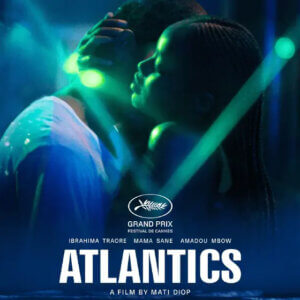
This haunting refugee story draws on elements of romance, loss, grief, family struggles, and the supernatural. It follows a young girl named Ada living in Dakar, Senegal, an Atlantic port on the Cap-Vert peninsula in West Africa. Ada wrestles with her feelings as she is in love with Souleiman, a construction worker who seeks a brighter future in Spain, yet she is betrothed to a wealthy man named Omar.
One night, Souleiman and the other construction workers decide to leave the country and travel to Spain via the Atlantic Ocean, which is used in many ways throughout the film as it symbolizes change, growth, life, and death. Things take a turn when Omar’s bed mysteriously catches fire in a suspected arson attack on their wedding day, and Ada falls under suspicion and succumbs to multiple interrogations. Ada anxiously awaits for Souleiman’s return after his abrupt departure, but as the film progresses, strange and unexplained incidents begin to occur throughout town.
The first panelist was Dr. Julius Adekunle, a professor in the Department of History and Anthropology at Monmouth, and a specialist in sub-Saharan African history, culture, politics, and religion. Dr. Adekunle offered a brief history of Senegal, first discussing its colonization by the French. He emphasized that this country remains deeply poverty stricken, as an estimated 46.7% of the population lives in poverty in Senegal, and continues to grapple with economic challenges, as economic growth is very slow. Dr. Adekunle also discussed the inequality between the rich and poor, which is the driving force for why the construction workers end up haunting the business tycoons later in the film. The spirits of the workers terrorize the rich to get revenge, forcing them to dig their graves so the spirits can finally rest in peace.
Dr. Lisa Vetere, an associate professor in the Department of English at Monmouth, focused her remarks on ghosts, witchcraft, and the supernatural in this film. She discussed the three main figurations in the film: (1) ghosts, specters, and spectrality, (2) The Atlantic Ocean, and (3) The Muejiza Hotel. Dr. Vetere commented on the metaphoric power of ghosts and hauntings in the film, as a ghost can serve as a metaphor for many different things. It is often hard to describe such things that exist in the “in between” reality – anthropologists may call it a “liminal figure.” Ghosts can serve as a way to bridge the gap in the relationship between absence and presence.
This installment of the World Cinema Series was a great success. Approximately 40 attendees enjoyed an evening of stimulating discussion of the film and many other global issues that the film represents, including inequality, migration, poverty, and social justice issues.

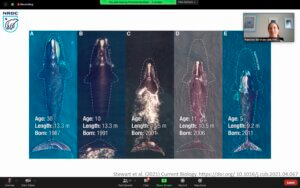
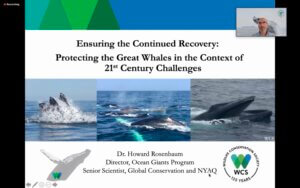
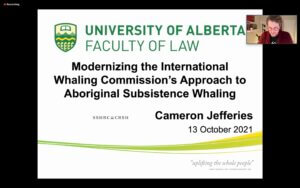 Dr. Jefferies then focused on aboriginal subsistence whaling, which is another contentious issue under the treaty, especially for Canada. In an effort to respect Indigenous communities that have practiced whaling for centuries as a cultural, nutritional, and social tradition, the IWC has grappled with allowing exceptions for these Indigenous rights. This process led Canada to withdraw from the IWC in 1981 because the IWC dismissed Canada’s need to protect whaling rights for indigenous communities.
Dr. Jefferies then focused on aboriginal subsistence whaling, which is another contentious issue under the treaty, especially for Canada. In an effort to respect Indigenous communities that have practiced whaling for centuries as a cultural, nutritional, and social tradition, the IWC has grappled with allowing exceptions for these Indigenous rights. This process led Canada to withdraw from the IWC in 1981 because the IWC dismissed Canada’s need to protect whaling rights for indigenous communities.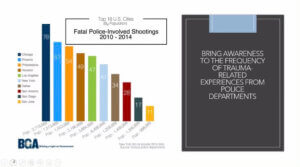 On Tuesday, October 12, 2021, Monmouth University’s School of Social Work Growing Together as Allies (GTAA) hosted guest speaker, Anjanette Young, for her presentation titled, “Living Beyond the Trauma of Racism: #Iam Her.” The event was co-sponsored by the Institute for Global Understanding and was partially funded by the Diversity and Innovation Grant from the Intercultural Center. GTAA is a committee of faculty, students and alumni working to advance anti-racism within the school, university, and community.
On Tuesday, October 12, 2021, Monmouth University’s School of Social Work Growing Together as Allies (GTAA) hosted guest speaker, Anjanette Young, for her presentation titled, “Living Beyond the Trauma of Racism: #Iam Her.” The event was co-sponsored by the Institute for Global Understanding and was partially funded by the Diversity and Innovation Grant from the Intercultural Center. GTAA is a committee of faculty, students and alumni working to advance anti-racism within the school, university, and community.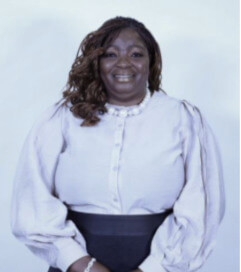

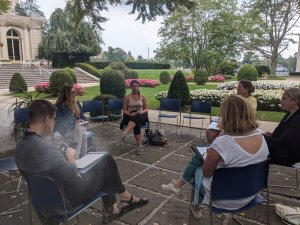 By Kyra Velock
By Kyra Velock 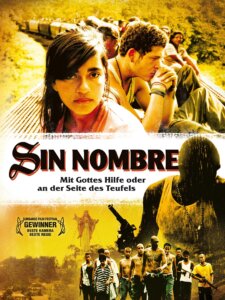
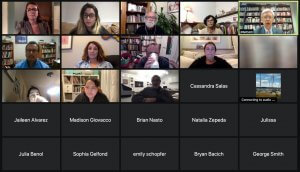

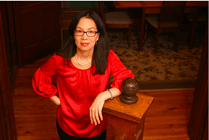 en to Su read several poems from Peach State, including “Lychee Express”, “Kiwi Fruit”, “Maple Syrup”, and “Black Sesame.” The discussion concluded with Professor Su answering questions from the audience about crafting her poetry, advice for writing poetry, questions that were specific to poems she had written, and more.
en to Su read several poems from Peach State, including “Lychee Express”, “Kiwi Fruit”, “Maple Syrup”, and “Black Sesame.” The discussion concluded with Professor Su answering questions from the audience about crafting her poetry, advice for writing poetry, questions that were specific to poems she had written, and more.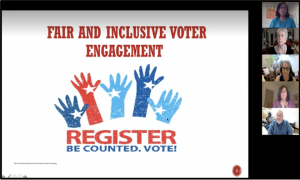
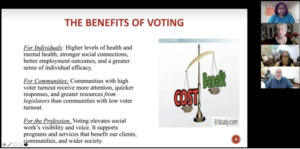
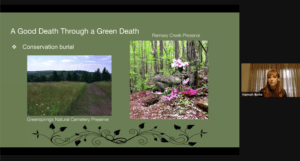 The panel began with MSW graduate student Hannah Burke on the innovative and useful practice of embalming. During the American Civil War, physicians preserved the bodies of soldiers who had died in battle and prepared them to return home intact. However, the process involved harsh chemicals, and the funeral industry quickly turned into a funeral market. Today, embalming a human body typically costs between $500 and $700, and funeral costs range from $7,000 to $12,000. This industry makes about $15 billion a year from grieving families. Burke explained how the practice of contemporary embalming has led to deforestation due to harsh chemicals, including the release of carbon monoxide into our environment, and to the “death denial” phenomenon in modern American society. In relation to this, embalming today does not involve family and loved ones in the process. Burke suggested that instead of the mainstream tradition of funerals, some eco-friendly options are natural and conservation burials. Both practices are not only ecosystems-friendly but cost significantly less than traditional funerals. Burke’s strategy captures the true essence of environmentally friendly methods to promote a more sustainable future.
The panel began with MSW graduate student Hannah Burke on the innovative and useful practice of embalming. During the American Civil War, physicians preserved the bodies of soldiers who had died in battle and prepared them to return home intact. However, the process involved harsh chemicals, and the funeral industry quickly turned into a funeral market. Today, embalming a human body typically costs between $500 and $700, and funeral costs range from $7,000 to $12,000. This industry makes about $15 billion a year from grieving families. Burke explained how the practice of contemporary embalming has led to deforestation due to harsh chemicals, including the release of carbon monoxide into our environment, and to the “death denial” phenomenon in modern American society. In relation to this, embalming today does not involve family and loved ones in the process. Burke suggested that instead of the mainstream tradition of funerals, some eco-friendly options are natural and conservation burials. Both practices are not only ecosystems-friendly but cost significantly less than traditional funerals. Burke’s strategy captures the true essence of environmentally friendly methods to promote a more sustainable future.